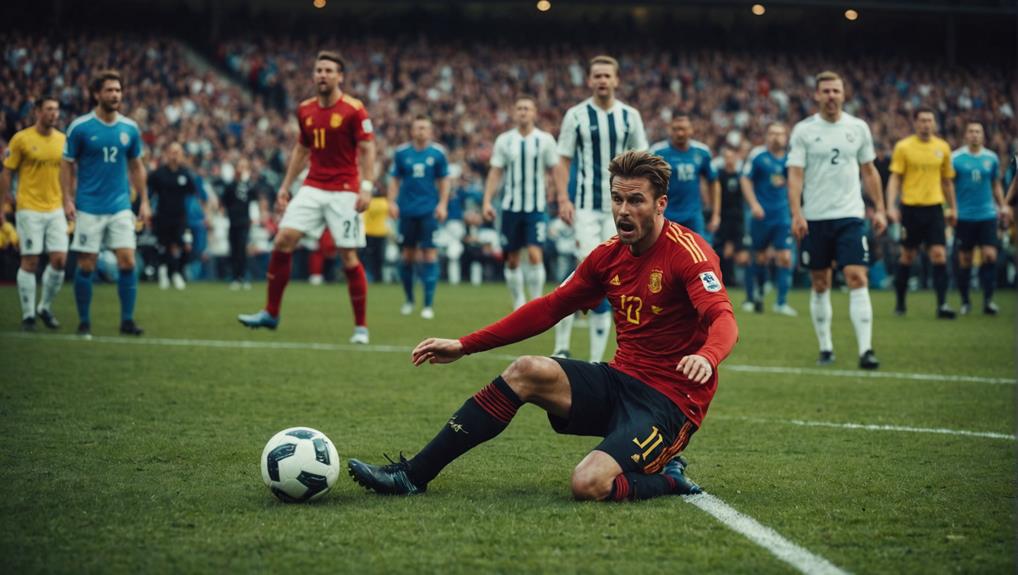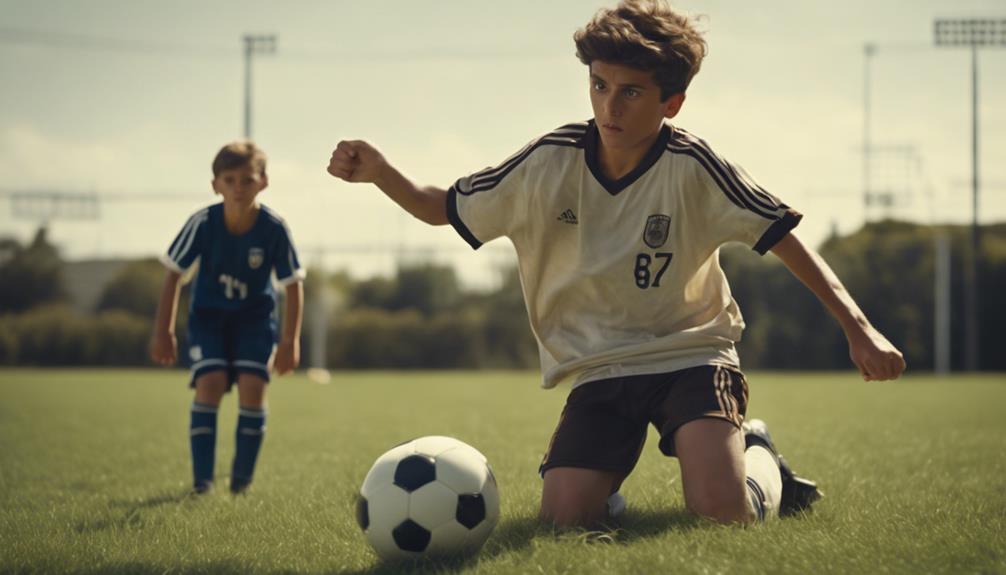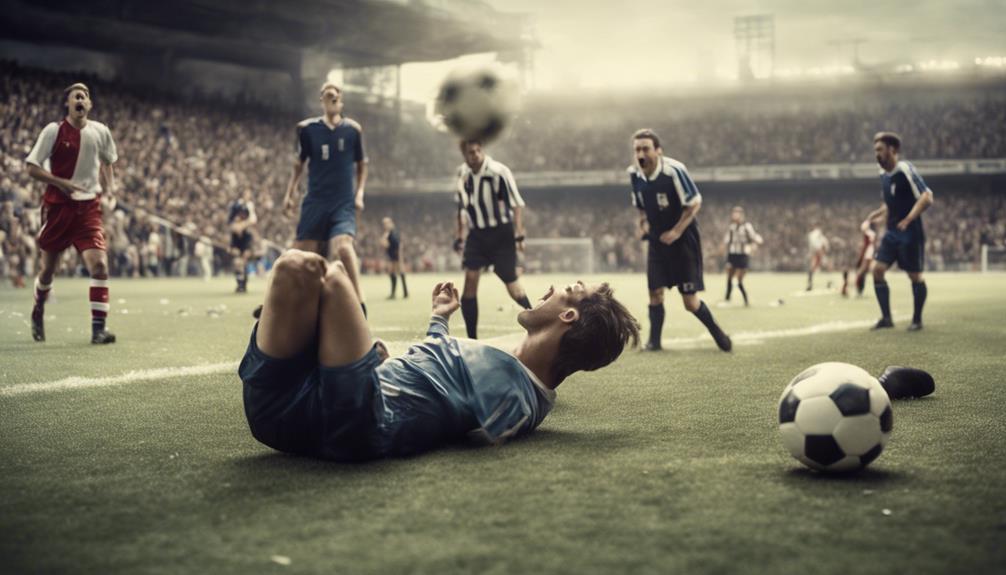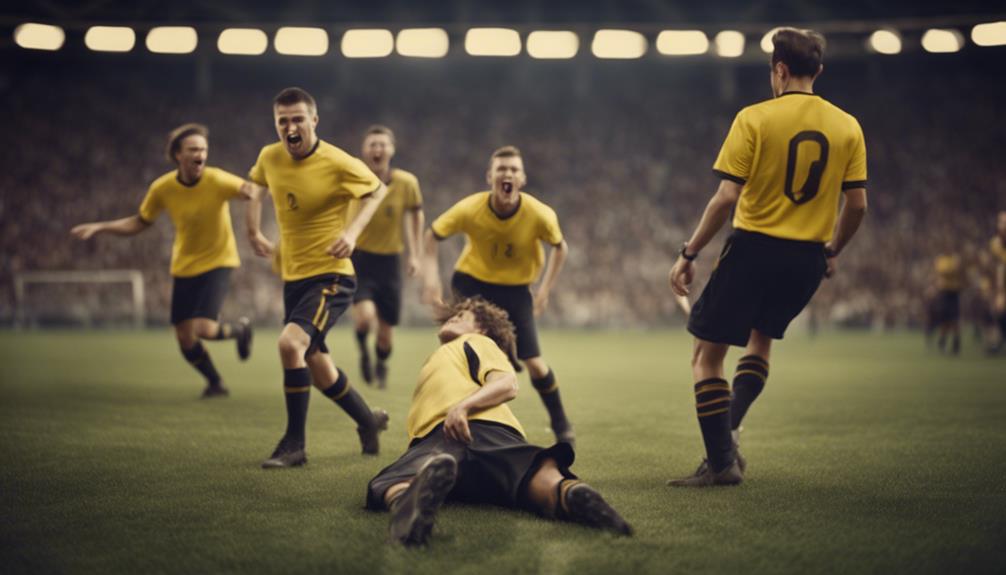
What Are Soccer Flops? Famous Cases and Reactions
August 10, 2024Plunge into the world of soccer flops where elite players like Fabregas and Ronaldo have displayed theatrical performances to deceive referees. Critics scorn diving for its unfair play, disrupting gameplay and risking penalties. Youth organizations prioritize ethical standards to combat such behaviors, focusing on honesty and fairness. Fans disapprove of flopping, questioning its strategic value and impact on the game's integrity. Explore player reputation effects, media backlash, and regulatory measures aimed at combating this unsportsmanlike conduct. Notorious cases involving infamous players like Drogba highlight the ongoing debate surrounding flopping in soccer.
Infamous Soccer Flop Incidents
When it comes to infamous soccer flop incidents, players like Fabregas, Ronaldo, Aliiev, De Rossi, and Drogba have each left their mark with their unique reactions on the field.
Fabregas found himself in a peculiar situation where he possibly kicked himself during a flop incident, causing quite a stir.
Ronaldo, known for his diving behavior, once took a kidney shot that added to his reputation for dramatic falls.
Aliiev, on the other hand, executed a possum-like flop, clearly faking an injury to deceive the referees.
De Rossi's flop incident was characterized by a delayed reaction, where he shockingly stood up after what seemed like a severe Achilles tendon tear.
Drogba, in contrast, had a justified response to an intense collision, showcasing a dramatic reaction to the impact that raised eyebrows among fans and critics alike.
These soccer flops have continued to spark debates about fair play and sportsmanship in the world of football.
Criticism of Diving Behavior
Critics widely condemn diving behavior in soccer for its unsportsmanlike nature and deceptive tactics. When a player exaggerates or fakes a foul to deceive the referee, it can lead to serious consequences. Diving not only goes against the spirit of fair play but also disrupts the flow of the game.
Players who dive risk receiving a yellow card if caught by the referee. This not only impacts their individual performance but also reflects negatively on their team. Furthermore, diving can result in an opposing player unfairly receiving a yellow card or even being sent off, affecting the balance of the match.
Additionally, when a player dives in the penalty area, it may lead to a free kick or penalty kick being awarded, potentially altering the outcome of the game. The prevalence of diving behavior in soccer has sparked debates about the need for stricter enforcement and harsher penalties to deter such unsportsmanlike conduct.
Age Discrepancy in Flopping

Youth soccer organizations maintain strict standards against flopping, instilling fair play values early on.
Consistency in regulating flopping is vital to uphold integrity and discourage cheating tactics in the sport.
Age discrepancy in flopping behavior underscores the importance of accountability and ethical conduct at all levels of soccer.
Youth Soccer Standards
The enforcement of fair play principles in youth soccer helps cultivate a culture of integrity and sportsmanship among young athletes. In youth soccer, the emphasis on fair play is pivotal in shaping the behavior of soccer players at a young age.
Unlike in higher-level competitions, flopping behavior is less prevalent in U16 or lower-level youth soccer matches. Youth soccer leagues prioritize teaching fair play ethics and don't tolerate flopping among their players.
It's essential that the standards set in youth soccer regarding flopping are upheld as players progress to higher levels of competition. Young soccer players look up to professional athletes as role models, making it essential for these figures to set a better example by avoiding flopping.
Consistent regulation of flopping behavior across all levels of youth soccer is necessary to promote fair play and integrity within the sport.
Consistency in Regulation
Ensuring consistent regulation against flopping across all age groups in soccer is fundamental for maintaining the integrity of the sport and promoting fair play principles.
While flopping behavior is less prevalent in U16 or lower-level matches due to stricter enforcement of fair play rules, it remains a concern at higher levels. Youth soccer leagues serve as a foundation for instilling values of sportsmanship and honesty, with zero tolerance for flopping.
It's vital that these standards are upheld as players progress to professional or elite levels, setting a positive example for the next generation. Role models in soccer must lead by example, avoiding flopping tactics and prioritizing integrity on the field.
Public Perception and Backlash
You might notice that fans are quick to express their disapproval towards players who flop during soccer matches.
The media also plays a role in criticizing these actions, further tarnishing the reputation of those who engage in flopping.
As a result, the public perception of players involved in such behavior can be greatly impacted.
Fan Backlash Against Flopping
Why do soccer fans react strongly against players who engage in flopping during matches?
One thing to keep in mind is the passionate nature of soccer fans, especially during high-stakes events like the World Cup, where emotions run high.
When players resort to flopping, viewers often feel a sense of betrayal and disappointment. Fans root for fair play and genuine competition, so when flopping occurs, it goes against the spirit of the game.
The strategic value of flopping is also questioned by spectators who value skill and sportsmanship over deceptive tactics.
As a result, fan backlash against flopping is significant, with supporters actively expressing their frustration and disapproval.
Maintaining the credibility and integrity of the sport is vital, and addressing flopping is essential to make sure that soccer remains a game of skill, athleticism, and fair competition that fans can wholeheartedly support.
Media Criticism of Floppers
The media's scrutiny of soccer floppers escalates as public outrage grows over their unsportsmanlike conduct and deceptive tactics on the field. Referees are often criticized for falling victim to floppers' embellishments, leading to concerns about referee bias affecting game outcomes.
Cultural acceptance of flopping varies across regions, with some cultures viewing it as part of the game while others condemn it as cheating. Ethical considerations come into play as floppers prioritize winning over fair play, sparking debates about the integrity of the sport.
Media outlets play an essential role in amplifying these issues, holding floppers accountable for their actions and fueling discussions on sportsmanship in soccer. Fans and pundits join in the criticism, expressing disappointment in players who resort to deceptive methods.
Social media platforms serve as arenas for mocking and condemning floppers, further shaping public perception and pushing for a change in how such behavior is addressed in the sport.
Impact on Player Reputation
Media criticism of soccer floppers can significantly impact a player's reputation, triggering public backlash and jeopardizing their standing within the soccer community. When players are seen as frequently engaging in flopping, their trustworthiness and sportsmanship come into question. Fans, media outlets, and fellow players may view them as dishonest and unsportsmanlike, leading to a loss of respect and credibility.
This negative perception can have far-reaching consequences, impacting not only their reputation but also their career opportunities. Sponsorship implications may arise as companies may hesitate to associate their brand with a player known for such behavior, causing career setbacks and financial losses.
In such cases, player accountability becomes critical in rebuilding a tarnished reputation and regaining trust within the soccer community. Ultimately, the evaluation of a player's sportsmanship and integrity plays a significant role in shaping how they're perceived both on and off the field.
Regulation and Fair Play

By implementing stricter regulations, soccer can effectively tackle the issue of flopping and promote fair play among players. Fair play lies at the core of soccer, emphasizing ethical standards and sportsmanship. Regulatory measures are vital in upholding these values by deterring players from engaging in deceptive tactics like flopping.
Consistent enforcement of rules against flopping is necessary to preserve the integrity and authenticity of the sport.
Encouraging fair play is necessary to combat the negative impact of flopping in soccer. Players and teams must be held accountable for their actions, ensuring that deceptive behaviors like flopping don't go unpunished.
Addressing flopping behavior not only promotes fair competition but also helps maintain the credibility and reputation of soccer as a sport. Upholding ethical standards and enforcing regulations against flopping are key steps towards fostering a culture of honesty and integrity on the soccer field.
Notorious Player Flops
Notorious instances of player flops in soccer have garnered widespread attention and criticism for their theatrical nature. Players like Fabregas, Ronaldo, Aliiev, De Rossi, and Drogba have been involved in controversial flop incidents that have sparked debates among fans, referees, and coaches.
Player accountability, fan reactions: Fans often hold players accountable for their exaggerated reactions on the field, questioning their sportsmanship and integrity. Instances like Ronaldo's kidney shot reaction and De Rossi's delayed response have faced severe backlash from supporters.
Referee consistency, player discipline: Referees play an important role in determining the legitimacy of player flops. Inconsistencies in how referees handle flop incidents can lead to frustration among players and fans, highlighting the need for more stringent player discipline.
Coaching influence, player responsibility: Coaches play a significant role in shaping players' behavior on the field. It's vital for coaches to emphasize fair play and discourage diving to uphold the integrity of the game. Ultimately, players bear the responsibility to act ethically and with honesty during matches to maintain the spirit of soccer.
Unique Soccer Flop Reactions

With unique ingenuity, soccer players and coaches have displayed a variety of unconventional reactions to simulate fouls and deceive officials in matches. Player reactions have ranged from the humorous to the outright bizarre, showcasing the lengths some individuals are willing to go to gain an advantage on the field.
Cultural differences can play a significant role in these reactions, with some actions that might be deemed unsportsmanlike in one culture being more accepted or even celebrated in another. This can lead to differing perspectives on what constitutes fair play in the world of soccer.
However, referees aren't always fooled by these antics. In many cases, the referee's response to these unique flop reactions can lead to consequences for the players involved.
Whether it results in a yellow or red card, fines, or even suspensions, players and coaches who resort to such tactics often find themselves facing disciplinary action for their actions on the pitch.
Creative Flopping Tactics
In the world of soccer, players and coaches have devised inventive tactics for flopping, demonstrating a flair for the dramatic and deceptive on the pitch.
- Creative Strategies, Player Reactions
- Bryan Carrasco's DIY Yellow Card, where he used his opponent's hand to hit his own face, left both players and fans in disbelief.
- German trainer Norbert Meier's attempt at a fake headbutt to draw a foul showcased the lengths some will go to for an advantage.
- The coach who staged a death scene akin to Bugs Bunny when an opposing manager put his hand near his neck sparked debates on sportsmanship.
- Mental Games, Strategic Advantages
- These creative flopping tactics play mind games with opponents, seeking to gain strategic advantages in pivotal moments of the game.
- By employing deceptive moves, players aim to disrupt the flow of the game and gain an upper hand over their adversaries.
- Ethical Implications, Sportsmanship Concerns
- While these tactics may provide short-term benefits, they raise ethical concerns about fair play and sportsmanship.
- The line between gamesmanship and unsportsmanlike behavior becomes blurred, prompting discussions on the integrity of the sport.
Impact and Solutions for Flopping

The impact of flopping in soccer extends beyond the pitch, affecting the integrity of the game and the perception of fair play among fans and players alike. To combat this issue, player accountability is critical. Teams must emphasize fair play to discourage embellishment and preserve the authenticity of the sport.
VAR technology plays a crucial role in identifying and penalizing flopping instances, ensuring a level playing field.
Coaching influence and referee training are also essential in reducing flopping. Coaches must instill values of sportsmanship in their players, emphasizing the importance of honesty on the field. Referees need to be well-trained in recognizing simulation and making accurate decisions to penalize offenders effectively.
Collaborative efforts among players, coaches, referees, and governing bodies are necessary to tackle flopping collectively. By working together towards integrity preservation, the soccer community can uphold the spirit of fair competition and eliminate unfair advantages.
Balancing competitiveness with ethical play is key to addressing the negative impact of flopping on the sport.
Conclusion
In the world of soccer, flopping is like a wolf in sheep's clothing.
While some may see it as cunning and strategic, others view it as deceptive and dishonorable.
As the game continues to evolve, players and fans alike must work together to root out this unsportsmanlike behavior.
By promoting fair play and integrity on the field, we can guarantee that the beautiful game remains untarnished by the dark shadow of flopping.


